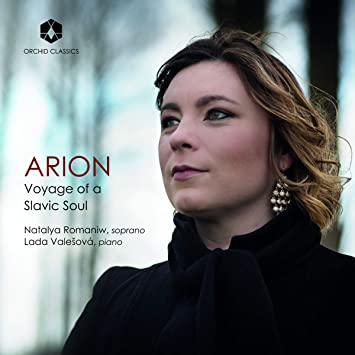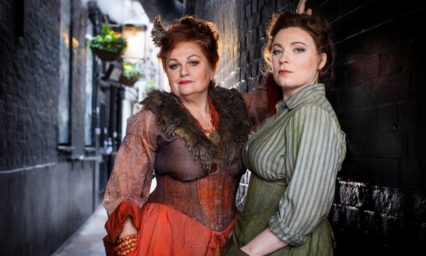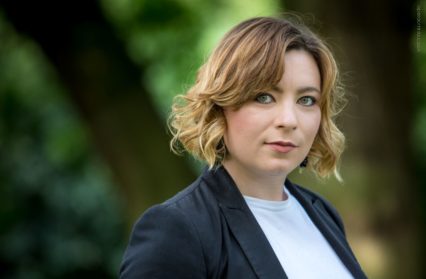Welsh opera star Natalya Romaniw describes her COVID-year to Linda Christmas, from the excitement of receiving prestigious awards to the disappointment of having no audience.
Last year offered one indelible operatic experience. It involved a visit to the car park at Alexandra Palace, North London, to hear a COVID-dodging performance of Puccini’s La Boheme while seated in a car, listening via FM on the car radio and watching, not the distant stage, but the vast screens on either side. The screens showed the singers in detail (including Roderick Williams’ Marcello wearing multi-coloured nail varnish), the orchestra on a high platform at the back of the stage and the conductor on a cherry picker. The production was a zany, ninety-minute revamp and the aim was to attract newbies: ENO claims forty-three per cent were first-timers. For this deprived-devotee, it was a must. And it turned out to be a lot more fun than most earnest education/outreach programmes.
Natalya Romaniw was Mimi. Romaniw is a gifted girl from Swansea who burst into our musical consciousness in 2009 by becoming the youngest person to represent Wales at the Cardiff Singer of the World competition. Since then, she has studied at the Guildhall in London and on the Young Singers programme at Houston, Texas, and garnered at least seven major prizes. She is generally accepted to be firmly on the path to stardom; the drive-in La Boheme underlined this and ensured that Romaniw had a better 2020 than most singers.
Natalya Romaniw: At least we had an audience! We did feel a sense of appreciation, but there was also a barrier. We felt somewhat disconnected: there was no intimacy between us and the audience, and there was no intimacy on stage either because of the need for social distancing. That was hard as we were trying to create a love story. Fortunately, I know David Butt Philips (Rodolfo) so it was not so hard for me. I first met him when we were both covering roles in Rake’s Progress at Glyndebourne in 2010 and we were in Iolanta together at Holland Park, so we didn’t have to build chemistry because it was already there.
We were all constantly aware of being two metres apart and as we were being filmed there were no allowances for slip ups! Still, I thought it worked. I liked the dancing; it introduced a fresh element. The production didn’t dwell too much on COVID like many people had expected it to. Instead, it rather tastefully highlighted our times. I didn’t find it at all crude: you have to buy into it all and then it becomes acceptable. It’s a good idea for now. It is the only way for now.
The rest of her year’s programme, which included concerts, a Prom and a starry Met Christmas extravaganza with Bryn Terfel, had one drawback: no audience.
Natalya Romaniw: I’ve got to say that I have had enough of performing without an audience. I am not a live broadcast kind of person. I get so nervous and I forget why I like music! There is a different atmosphere: it is horrible. I know many singers share this view. It is not the same as walking on from the wings, greeting my audience and feeling I am going to communicate with them. We are filmed from every angle, and every little bit of sound is picked up. It’s become the only way of being able to transmit performance and I understand that so I try to enjoy it, but there is nothing like having an audience in front of you. We really miss the connection. Even the sound of silence is music; the moment when you know you have the audience in the palm of your hands.
I was in the middle of a run of Madam Butterfly at ENO when COVID first hit the UK. It takes a while to feel that you are really in the flow, your confidence is high and you are enjoying everything. I felt so happy and was climbing up professionally, but COVID stopped me in my tracks. That’s not to say I haven’t achieved anything this year. I should admit, I have been incredibly lucky: although I had my work taken away from me, other work came in its place. It has also been pleasantly surprising to know that I have been on people’s minds. The Royal Philharmonic society gave me the Singer Award for my roles at Scottish Opera, English National Opera and Opera Holland Park, and Gramophone made me Young Artist of the Year for my debut album.

Romaniw’s new album, Arion: Voyage of a Slavic Soul explores repertoire by the Russians (Tchaikovsky, Rimsky-Korsakov and Rachmaninov) and the Czechs (Dvořák, Janáček and Novák). The selection boldly includes the unfamiliar, and cleverly emphasises her background.
Her Slavic surname comes from her grandfather, a Ukrainian who settled in Swansea during the 1940s and who helped raise her while her single mother worked as a police officer. Her grandfather loved singing, Cossack-style dancing and playing the accordion, activities he could indulge in at Swansea’s Ukrainian club. Romaniw joined in.
Natalya Romaniw: I speak with a Welsh accent and I am proud to be Welsh. Wales is such a musical nation and the fact that I chose to study singing is largely down to the Welsh education system. Today, we have to fight hard for music in every area, particularly in schools, but for me it was just something we took for granted at Bishop Vaughan school in Swansea.
That said, I feel that my soul is wholly Eastern European; my affinity to the music is very strong. That explains the content of my first album. The songs reflect pain and suffering, representing the Eastern-European side of me whilst also embodying my own personal experiences; you can’t communicate pain and suffering in the voice without having suffered pain. For me, this pain is caused by a form of loneliness that has always been there. It gets worse as you get older. As you become more successful, you endure suffering in terms of the artistic and personal life sacrifices you have to make. I would say that on the surface, my career seems to have followed an incredible, easy path, but on a personal level, it has not. It’s not necessarily to do with not having a partner, it’s more to do with health and family, all the things that chip away at one. My mother always said, “You’ve got to develop a thicker skin”. At 33, it is still developing!
As well as being present on the debut disc, a Slavic influence can be seen in Romaniw’s repertoire: Onegin, Queen of Spades, Iolanta, Jenufa and the postponed Rusalka. Her Slavic heritage also made her a natural choice as the soloist for Mark-Anthony Turnage’s Testament. The song cycle uses poems by three Ukrainian-born poets and was written for the Bournemouth Symphony Orchestra and its Ukrainian music director, Kirill Karabits.
This, in turn, will lead to her debut at the ROH in a few years’ time. Turnage is composing a new work, based on a play. “It has Gerald Findlay as my Dad and Alan Clayton as my brother, but I can’t say more for the moment”, says Romaniw.
The new Turnage won’t be her first contemporary opera. She was drafted into Ian Bell’s Jack the Ripper: the Women of Whitechapel at ENO when Claudia Boyle withdrew.

Natalya Romaniw: There is a lot of freedom when you are interpreting a role for the first time. There’s a living composer, present at rehearsals, and that’s a wonderful gift. It allows you to have more artistic input. With Bell’s Jack the Ripper, there was an on-going, flowing, creative discussion and my ideas were welcomed.
For a singer with so much talent and promise, Romaniw was slow to realise she had a voice that was in any way special.
During school I always felt a bit out of place. I was rarely put in the soprano section because I stood out and couldn’t blend, so I was used to bulk up the mezzo or alto sections. I was always a bit frightened of the top of my voice because I thought that it was unruly and not sweet enough. I could sing loudly or not at all. I didn’t realise then that it was all down to breathe control.
When she went to Guildhall in London, Romaniw had no clear idea of what the future might hold. The thought of teaching was hovering in the background, but singing opera did not occur to her until her second year.
Natalya Romaniw: I remember when the penny dropped. My teacher asked me to learn Dove Sono, the Countess’ aria from The Marriage of Figaro. I loved it so much! My teacher said, “You are really good at this; you can really make a career of this,” and I thought “You know what, you are right!”. From that point onwards I believed I could be an opera singer.
The Countess is a role for a lyric soprano and that is the fach (singer classification) attached to all of Romaniw’s roles so far. She has been described as a dramatic soprano but says it is more accurate to describe her voice as lyric, or maybe spinto (light dramatic soprano).
Natalya Romaniw: Let’s settle for big lyric with potential to develop! My voice is opulent. There’s both a steeliness and a warmth. I very much like the richness at the bottom of my voice. I listened to my CD the other day and in one song I found myself thinking, “Wow! That’s low!”. I’d love to sing Carmen!
For now, I need to learn Alice Ford for Verdi’s Falstaff (with Bryn Terfel) at Grange Park. It’s hard to commit to learning new roles when you just don’t know what is happening. This is already a tough industry to be part of; it doesn’t provide security at the best of times, but the pandemic is soul destroying and anxiety provoking. I am one of the lucky ones. Recently, I saw a pal working in a clothing shop part time. I didn’t expect that she would be so hard hit. I am in mourning for the state of our industry.
Many of us share this sense of mourning. Opera remains a minority interest and therefore at the bottom of lists of coronavirus-induced concerns. No one has a clear view of the future. There’s not even another drive-in on the horizon.
Linda Christmas is a journalist and an opera devotee of fifty years.
(Header image: Natalya Romaniw. Credit: Patrick Allen.)












